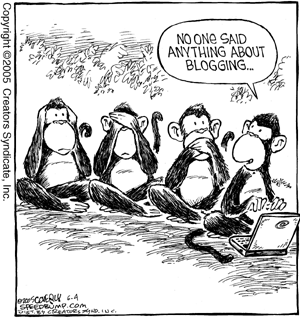How much longer till monkeys are running the local 7-11??
(Guess I need to put in some applications)
Chimps caught using 'tool kit'

SCIENTISTS working in west Africa have caught chimpanzees on camera using a "tool kit" to break into a termite mound.
The remarkable film shows one chimp using its feet to push a thick stick into the termite nest, like a gardener digging up potatoes. Then the same animal takes another tool, a slender stem with a frayed end, and inserts it into the hole to fish out the insects.Chimps have been observed before cracking nuts with stones and catching ants and termites with twigs and leaves. But this is the first recorded example of the apes equipped with multiple tools.
The video footage, which has just been brought back from Africa, was taken by a team of scientists in the Congo using a hidden camera.
Andrew Whiten, of the University of St Andrews in Scotland, told scientist s in the US: "This chimpanzee is using a tool kit." While termite fishing was already well known in many chimpanzee groups, he said: "Here you've got an extra technique that hasn't spread yet."
s in the US: "This chimpanzee is using a tool kit." While termite fishing was already well known in many chimpanzee groups, he said: "Here you've got an extra technique that hasn't spread yet."
The human-like antics of the chimpanzees are the latest example of what scientists call "culture" in animals.
Culture is defined as a traditional behaviour that is learned within a group and passed between individuals and down generations.
More than 40 examples of cultural behaviour have been observed in chimpanzees, our closest animal relative. They have also been seen in wild orang-utangs living in Asian rainforests.
Scientists think culture goes hand-in-hand with social living and is both a product of intelligence and its spur.
Speaking at the annual meeting of the American Association for the Advancement of Science in St Louis, Professor Whiten said: "We've come to a really exciting stage in our understanding and knowledge of great apes, which has built up over the last 40 years."

0 comments:
Post a Comment